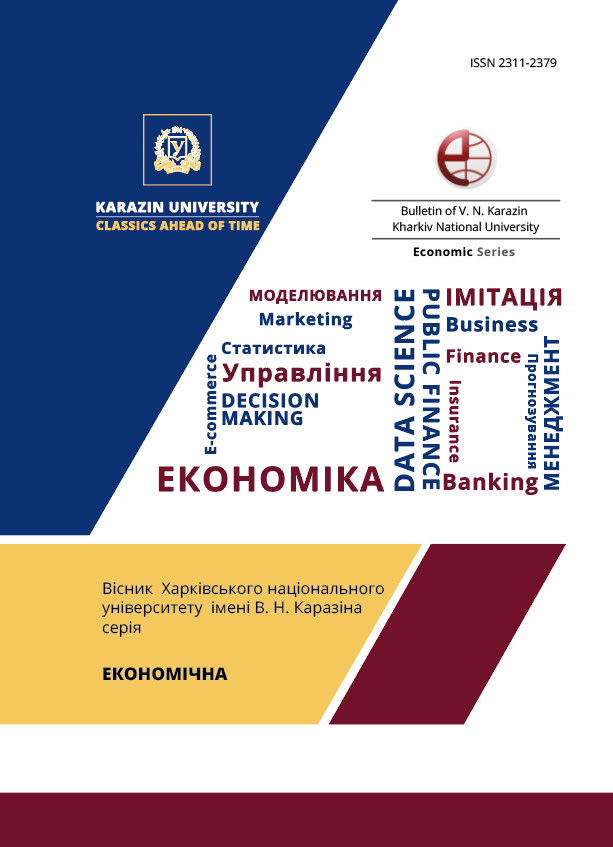Оцінка ставлення українців до цінностей Європейського Союзу: емпіричні результати
Анотація
Метою статті є оцінка змін сприйнятті цінностей Європейського Союзу суспільством в Україні в умовах зовнішньої агресії. В роботі досліджується питання впливу ескалації конфлікту на суспільні погляди різних груп, а також як змінюється ставлення та переконання щодо прийняття цінностей Європейського Союзу в суспільстві. У статті аналізується поняття цінності та вказуються на девальвацію культурних і соціальних цінностей у деяких групах населення. В статті використовується результати опитування на основі проведеного онлайн-інтерв'ю та проведено аналіз з використанням методів дескриптивної статистики. Анкету для опитування було створено на основі використання методології Шварца у Всесвітньому дослідженні цінностей 2020. У 2022 році серед громадян України в усіх регіонах, крім окупованих територій, було проведено онлайн-дослідження світогляду українців щодо сприйняття цінностей Європейського Союзу. Наведені результати опитування підкреслюють тенденцію прихильності значної частини громадян України до європейських цінностей. Дослідження демонструє відсутність задоволення серед громадян у питаннях: невідповідності соціальних цінностей і стереотипів, дотримання законів, особистих свобод та прав людини, рівня економічної свободи. Отримані висновки свідчать про доцільність продовження дослідження ціннісних змін у суспільстві. Створення привабливих умов та формування вірувань і переконань у напрямку поширення та адаптації цінностей Європейського Союзу сприятиме європейській інтеграції України.
Завантаження
Посилання
Value, Philosophical Theories of. (2020). New World Encyclopedia. Retrieved from https://www.newworldencyclopedia.org/entry/Value,_Philosophical_theories_of.
Lee, S. M., & Peterson, S. J. (2000). Culture, Entrepreneurial Orientation, and Global Competitiveness. Journal of World Business, 35, 401-416. doi: https://doi.org/10.1016/S1090-9516(00)00045-6.
Young, M. (2022). Less Clash of Civilizations’, more rift. 20.05. Retrieved from https://en.qantara.de/content/ukraine-and-the-wests-selective-values-less-clash-of-civilisatio.
Ukraine in World Values Survey (2020). Resume of the Analytical Report. Kyiv: NGO Ukrainian Centre for European Policy .
Schwartz, S. H. (1992). Universals in the Content and Structure of Values: Theoretical Advances and Empirical Tests in 20 Countries. Advances in Experimental Social Psychology, 25, 1-65.
Verdun, A. (2005). An American-European Divide in European Integration Studies. In the book “The Political Economy of European Integration. Theory and Analysis.” Eds. Erik Jones and Amy Verdun. London and New York: Routledge Taylor & Francis Group.
Tallis, B. (2023). Introduction: Identities, Borders, and Orders in Central and Eastern Europe. In: Identities, Borderscapes, Orders. Frontiers in International Relations. Cham: Springer. doi: https://doi.org/10.1007/978-3-031-23249-7_1.
Dymchenko, O., Rudachenko, O., Yesina, V., & Tararuiev, I. (2021). Economic Potential of Ukraine: Assessment and Forecasting. The 3rd Eastern European Conference of Management and Economics (EECME 2021) – Sustainable Development in Modern Knowledge Society. doi: https://doi.org/10.1051/shsconf/202111101014.
Sologoub, I. (2022). Ukraine’s EU Integration: A Long Way Home. Intereconomics, 57(4), 218-224. doi: https://doi.org/10.1007/s10272-022-1066-1.
Nafus, I. (2018). System of Values as a Basis for Social Capital Formation. Intellect XXI, 1, 179-182.
Gataullin, A., & Lebedev, A. (2011). The Degree of Freedom of Social Subject in the Space of Post-Ideology. Scientific Notes of Kazan University. Humanitarian Sciences, 153(1), 32-41.
Halman, L., Reeskens, T., Sieben, I., Zundert, M. (2022). Atlas of European Values: Change and Continuity in Turbulent Times. Tilburg: Open Press TiU.
Reflections on European Values. (2022). Honouring Lock Halman’s Contribution to the European Values Study. Eds. Ruud Luijkx, Tim Reeskens, Sieben Inge. European Values Series. Publisher: Open Press TiU. doi: https://doi.org/10.26116/09eq-y488.
Reeskens, T. (2022). Are Ukrainian values closer to Russia or Europe? Retrieved from https://blogs.lse.ac.uk/europpblog/2022/03/04/are-ukrainian-values-closer-to-russia-or-to-europe/.
Nosova, O. (2022a). Transformational Change: Challenges and Development Prospects. The Case of Ukraine. Social Entrepreneurship Review, 1. Retrieved from https://ser.uek.krakow.pl/index.php/ser/article/view/79/73.
Social Screening of Ukrainian Society During the Russian Invasion – the Twelfth Way of the Study (2022). Analytical Report. Gradus Research Company. Retrieved from https://gradus.app/en/open-reports/gradus-eu-wave-12-ua/.
Ukrainian Society and European Values (2022). Report on the Results of Sociological Research. Gorshenin Institute. Kyiv: Friedrich Ebert Stiftung.
Nosova, O. (2022b). Transformation of the Social-Economic and Political Values in Ukraine to the European Union Values. Bulletin of V. N. Karazin Kharkiv National University Economic Series, 103, 5-16. doi: https://doi.org/10.26565/2311-2379-2022-103-01.
Nosova, O., Lypov, V. (2022). Cultural Values in the Formation of Economic Relations. London Journal of Social Sciences, 2(4), 20-33. doi: https://doi.org/10.31039/ljss.2022.4.86.
Social Trends 2023 from Gradus Research (2023). Like War Turned Ukrainians Into a More Conscious Nation. Retrieved from https://gradus.app/uk/open-reports/.
War and the Church. Church and Religious Situation in Ukraine in 2022. (2022). Razumkov Center. Retrieved from https://razumkov.org.ua/napriamky/sotsiologichni-doslidzhennia/viina-i-tserkva-tserkovnoreligiina-sytuatsiia-v-ukraini-2022r-lystopad-2022r?fbclid=IwAR1NxjtMmncRIVWv-UoneYZLlu4471nR3kwxAnFCK_JHIWqZPnYhbxxYakg.
The Global Risks Report 2023. 18th Edition. Insight Report. World Economic Forum. Retrieved from https://www.weforum.org/reports/global-risks-report-2023/.
Hrushetsky, A. (2022). How Ukraine Sees the Future in 10 Years and Wiliness’ to Endure Material Difficulties. Press release. Retrieved from https://kiis.com.ua/?lang=ukr&cat=reports&id=1157&page=1.

